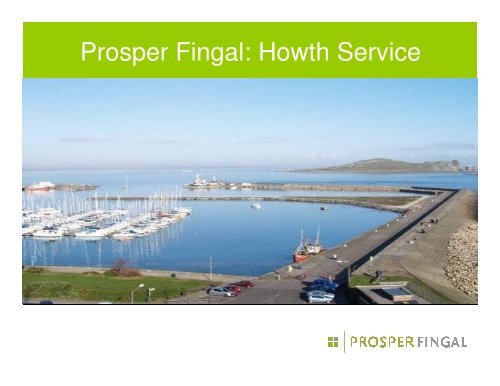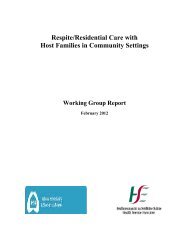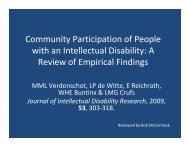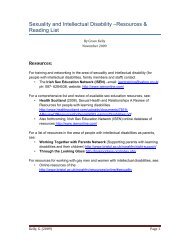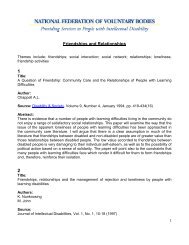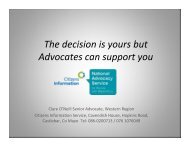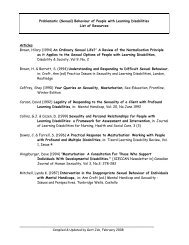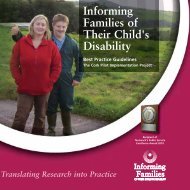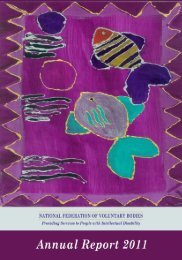Prosper Fingal: Howth Service
Prosper Fingal: Howth Service
Prosper Fingal: Howth Service
You also want an ePaper? Increase the reach of your titles
YUMPU automatically turns print PDFs into web optimized ePapers that Google loves.
<strong>Prosper</strong> <strong>Fingal</strong>: <strong>Howth</strong> <strong>Service</strong>
Community-Based Support <strong>Service</strong>
Policy states supports to the individual should be:<br />
• Community based and integrated.<br />
• Accessed through mainstream options/services.<br />
• Person-Centred.<br />
New Directions<br />
• Individual rather than group based.<br />
• Be “outcomes” driven.<br />
• Local to the person and their home.<br />
• Evidence based.
Why <strong>Howth</strong>, Sutton & Baldoyle?<br />
• Gap in service provision - local need.<br />
• Opportunity to build capacity for the future.<br />
• Establish a presence in the southern most area<br />
of <strong>Fingal</strong>.<br />
• “Green field” situation.
Background to <strong>Howth</strong> <strong>Service</strong><br />
• Pilot Project (from existing resources).<br />
• Move away from centre-based mindset & approach.<br />
• Individualised, not based on groups.<br />
• Mainstreaming – ‘ordinary things in ordinary places’.<br />
• Embedded in the community, a local service for local<br />
people.<br />
• Priority placed on building bridges/reciprocal<br />
partnerships in the community (PR role).
Getting to know the Community<br />
• In-depth research of the catchment area, amenities &<br />
opportunities divided into 18 domains.<br />
• Identified key figures/groups in the community.<br />
• January 2012: hosting of first <strong>Prosper</strong> <strong>Fingal</strong> Community<br />
Information Sharing Evening.<br />
– 21 groups represented & contact made with 16<br />
groups who couldn’t attend on the night.<br />
– Follow on meetings organised.<br />
• Build reciprocal partnerships within the community.
Getting to know the People we<br />
Support<br />
• Initially seven individuals, now eight.<br />
• Spent time exploring their<br />
interests/likes/dislikes/goals/<br />
aspirations…<br />
• ‘Making the match’ was key.<br />
• Developing & maintaining<br />
reciprocal partnerships with both<br />
individuals and families/carers.
<strong>Howth</strong> Library<br />
Community Connections<br />
St. Joseph’s<br />
Primary School<br />
KLEAR<br />
La Verna Day Centre
Mercury Group<br />
9.30am –<br />
10.00am<br />
10.00am –<br />
11.15 am<br />
Changing Routine<br />
MONDAY TUESDAY FRIDAY<br />
Friendship leisure or drama or<br />
choice<br />
Prep for Work T2 Independent Living<br />
Skills<br />
choice<br />
11.15am –<br />
11.35am Break Break 11.15 - 11.45 Break Break Break<br />
Health T1 leisure or choice art or choice Independent Living<br />
Skills<br />
choice<br />
11.35am –<br />
1.00pm<br />
1.00pm –<br />
2.00 pm Lunch Lunch Lunch Lunch<br />
Communications T1 Citizenship T2 Communications – IT<br />
2.00pm - 3.10 pm<br />
3.10pm - 3.30pm<br />
Group feedback Group feedback Group feedback<br />
choice<br />
Group feedback
Changing Routine
Challenges<br />
• Significant Challenges for all stakeholders:<br />
– Individuals we support<br />
– Family<br />
– Community<br />
– <strong>Prosper</strong> <strong>Fingal</strong><br />
– H.S.E.<br />
– Government agencies<br />
– Local and other NGO’s<br />
• Change for all!
Claire & Brid<br />
• Video captures some of the challenges for Claire<br />
& her mother.
Typical Support System<br />
Report of Disability Policy Review, Figure 2, pg 64.<br />
Person<br />
Family/Natural<br />
supports<br />
Informal supports<br />
Formal supports
• Community:<br />
Challenges<br />
– Initial & continued buy-in<br />
– Fear/scepticism<br />
– Trust<br />
– Requested need for continued <strong>Prosper</strong> <strong>Fingal</strong> support
• <strong>Prosper</strong> <strong>Fingal</strong>:<br />
Challenges<br />
– Different Roles and Responsibilities<br />
– Lots of plates spinning (time management)<br />
– Engaging with families/carers on a different level<br />
– On-going support needs<br />
– Maintaining community partnerships<br />
– Gaps in staff training, need for up-skilling?<br />
– Positive risk management<br />
– Filling “the gaps” with meaningful occupation
• H.S.E.<br />
Challenges<br />
– Understanding the “support” model concept &<br />
application<br />
– Interpretation of support (direct/indirect)<br />
– Substantial costs associated with this service model<br />
– Dramatic shift from the traditional group & centre<br />
based model<br />
– Significant resource requirement at set-up & on an<br />
ongoing basis to maintain supports<br />
– Less certainty for the individual & family<br />
– Issues around client referral & placement
Next Steps<br />
• Continue to link in with community groups &<br />
develop new opportunities.<br />
• Work on life goals with the individuals we<br />
support.<br />
• Promote independence.<br />
• Maintain trust/reciprocal partnership with<br />
families/carers.
Thank You!


